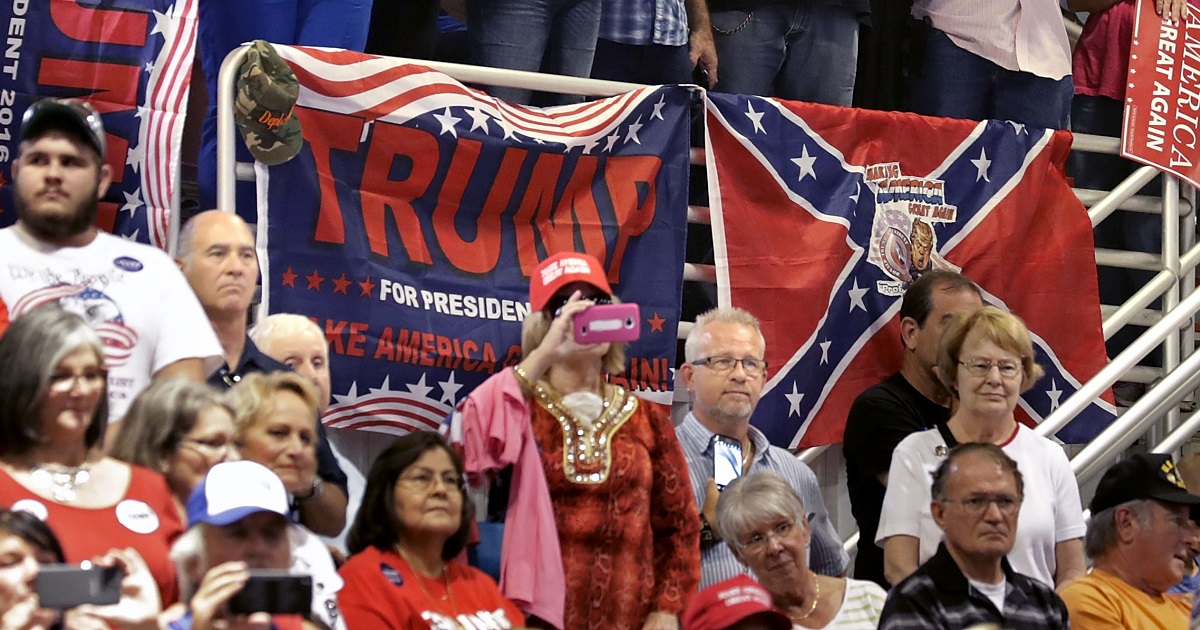

Far-right Proud Boys leader Enrique Tarrio, 34, arrives at Roger Stone’s house to show solidarity with indicted Trump associate wearing a t-shirt professing his innocence.
The United States is in a mess.
COVID-19 is raging out of control in many areas of the country. Black Lives Matter protests are disrupting cities, in some cases themselves disrupted by counter-protesters. Debates over gun control continue across the country, tornadoes, hurricanes and wildfires seem to increase in numbers and size each year.
Could matters get worse? Yes, they could, in large measure due to Donald Trump’s core supporters.
Who are these people and why is it possible, indeed likely, that they will make the situation worse?
The 20 per cent or so of Americans who follow Trump no matter what, as opposed to the other 20 plus per cent who vote for him as a Republican or because they believe he’ll cut their taxes, are largely the forgotten, the ignored, the disrespected.
In the early 20th century, those in the southern and western United States resented the federal government, largely controlled by politicians from the northeastern reaches of the country.
The West was underpopulated and felt ignored; the South was angry over the loss of the Civil War, the harsh terms of Reconstruction and the end of slavery, which had fuelled the southern economy.
The West, especially California and Texas, is now an economic powerhouse, and no longer feels ignored. In the South, however, there is still a degree of resentment that southern views are not reflected in national policies. Trump has been trying to amplify this resentment with his defence of statues of Confederate heroes and of keeping the names of Confederate officers on military bases.
Evangelical Christians
Trump’s followers are a diverse alliance. Southerners who feel ignored are just one faction within a broad alliance of citizens who feel that the national government does not serve them. One other easily identifiable group are evangelical Christians.
Non-Americans tend not to realize the scope of evangelical Christianity in the United States and are often puzzled by the many references to God in speeches by politicians, especially federal politicians.
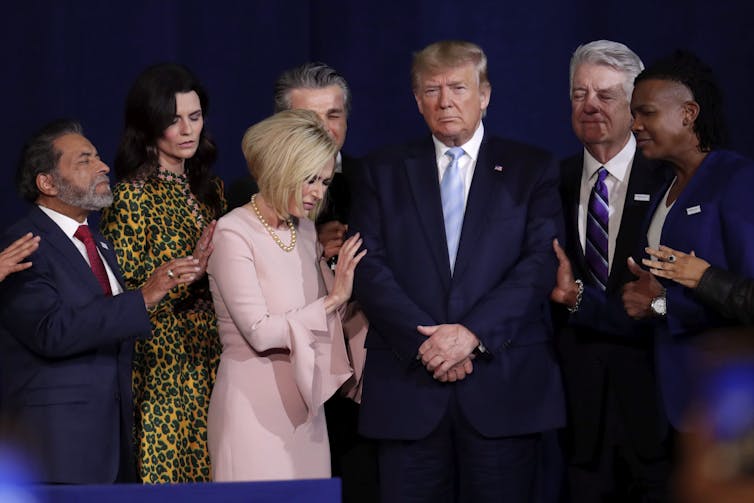
In this January 2020 photo, faith leaders pray with President Donald Trump during a rally for evangelical supporters at the King Jesus International Ministry church in Miami.
(AP Photo/Lynne Sladky)
These are references to the idea that Americans are God’s chosen people. This is, however, not a homogeneous group, despite media generalizations. Not all are anti-abortion and anti-gay, but many have a sense that America is sliding backwards morally.
That explains why a segment of the movement supports a president who is almost certainly a serial adulterer — his speeches and his actions correspond with their concerns.
Trump was the first president to attend the annual March for Life this past January, and supporters also welcomed his appointment of social conservatives to the Supreme Court, bringing it closer, they believe, to overturning Roe vs. Wade, which legalized abortion.
Xenophobes, the economically disadvantaged
Another segment of hard-core supporters feel strongly that America is under attack by foreigners, including Central Americans crossing the southern border. They also falsely believe the Chinese sent COVID-19 to kill Americans.
Sixty years ago, these supporters would have been in the “my country right or wrong” camp supporting American involvement in the Vietnam War. They believe they are supporting traditional American values, free enterprise, hard work and white society against destructive change.
For these supporters, Trump promised the wall along the southern border to keep out “rapists,” talks often about “the Chinese virus” and says kind things about counter-protesters, even excusing the actions of the young man, Kyle Rittenhouse, accused of killing two people at a Black Lives Matter demonstration in Wisconsin.
A sizeable segment of Trump supporters, and the ones who often get the most attention, are the economically abandoned. When Trump was elected, some in the media were quick to dismiss his supporters as lacking education, and therefore unable to grasp that Trump lied, embellished the truth and stoked bigotry.
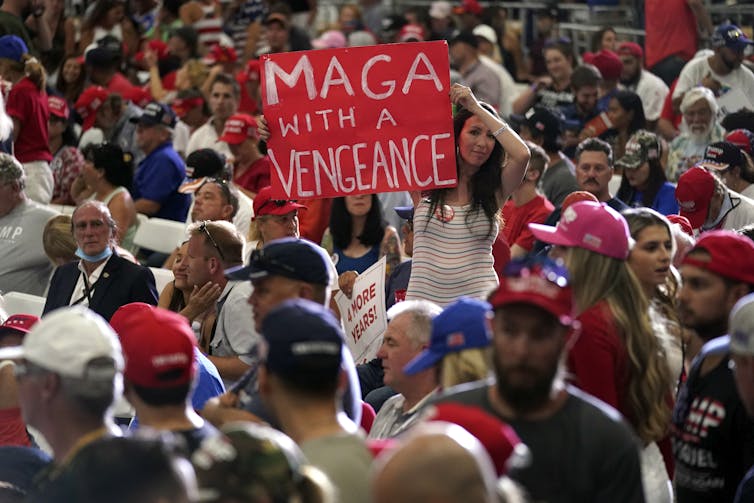
That’s unfair on several levels.
For one, as corporations move their manufacturing offshore and the U.S. economy relies more on high-tech jobs, the less educated have lost their jobs, whether in the coal mines of West Virginia or the industrial areas of the Midwest.
Understandably, they’re attracted to a president who slapped tariffs on foreign countries, including China and Canada, in the hopes manufacturing jobs will return to America.
Not surprisingly, people who believe they’ve watched the American dream of “work hard and you will succeed” vanish have lost patience with politicians on Capitol Hill who seem only to care about power. And so they’ve turned to a populist, someone who seems to understand. A lot of them don’t care about Trump’s lies; they only care that he talks about their problems.
And not all of those suffering economically are manufacturing or industrial workers service with poor education. There are middle-income earners who have been hurt by the flight of industry, which resulted in regional downturns in the economy.
The news industry
Fifty years ago, a sizeable portion of the American population would tune in every evening to the nightly news on one of three networks and listen to a trusted anchor deliver the news. Now many choose either CNN or Fox, throwbacks in many ways to newspapers of the 19th century that supported one political party and framed the news to favour that party.
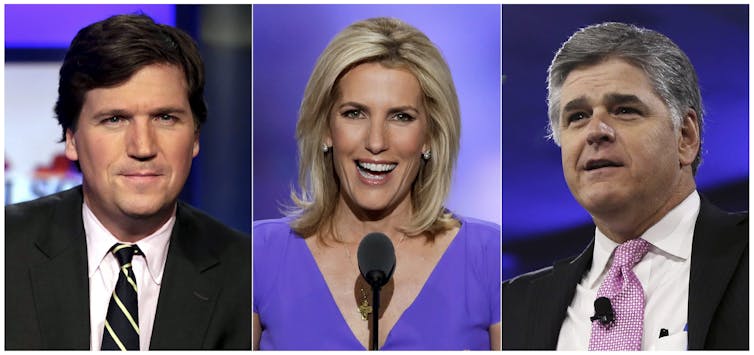
This combination photo shows, from left, Fox News personalities Tucker Carlson, Laura Ingraham and Sean Hannity. The three reach three million to four million people per weeknight with a full-throated defence of Trump. (AP Photo)
Not surprisingly, this approach reinforces existing views of what is going on in the United States. The traditional networks have lost the large audiences of earlier years and local news in most markets has become infotainment.
Many people, even those who didn’t bother watching news in past, now get a quick fix from the internet, the source of much of the “fake news” that Trump claims the mainstream media circulate, but really originates in the minds of internet fraudsters.
How many times, for example, have we heard that COVID-19 is a Chinese biological weapon, sent to destroy the American population?
Read more:
There is no evidence that the coronavirus was created in a laboratory
Can we blame lack of education for Trump support when even well-educated individuals have their views of the world reinforced by what they see on the internet or on a cable news channel?
Throw in a number of militant supporters of small government and lower taxes, and you have the hard-core Trump supporters.
Violence a real possibility
Many who identify with these different groups may fall into more than one category; for instance, evangelical Christians who are angry about the de-industrialization of America.
Why are Trump supporters likely to make the situation worse this election?
The answer should be obvious. When a group feels that something critical has been denied them for a long time, its members will protest. If the protest still does not bring about change, some or all will resort to violence to try to force change.
Among the staunch Trump supporters are those who will merely vote for him, those who will demonstrate for him — something Trump encourages — and those who will use violence in order to ensure the re-election of the man they see as their only potential saviour. Violence is a real possibility as the campaign progresses.
Should Trump lose to Joe Biden, the new president must quickly show sympathy towards the economic issues embodied in the pro-Trump movement and empathy towards the more contentious goals of Trump’s supporters, or it is almost certain the violence will escalate.![]()
Ron Stagg, Professor of History, Ryerson University
This article is republished from The Conversation under a Creative Commons license. Read the original article.


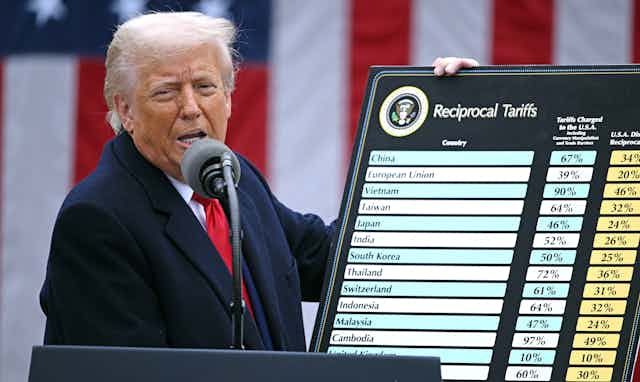

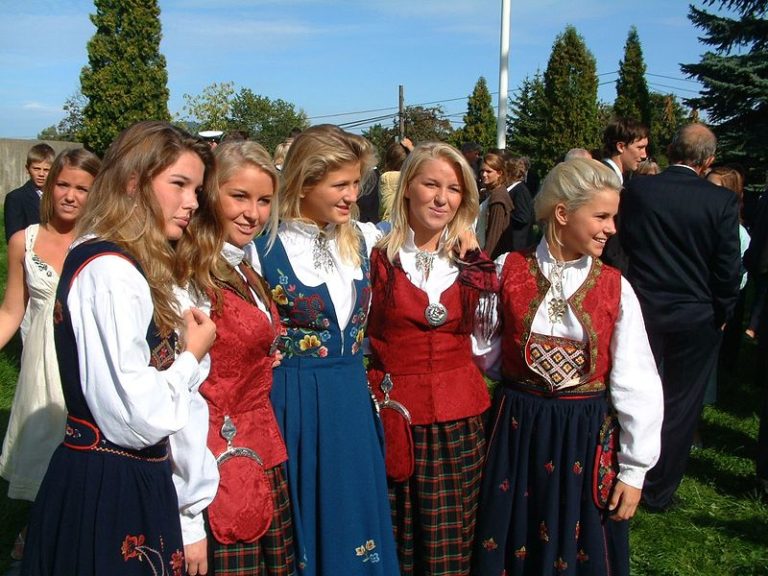
18 Comments
Pingback: soothing music
Pingback: relaxing music
Pingback: wenxin keli
Pingback: สล็อต PG แตกง่าย
Pingback: get passport online
Pingback: ดูหนังเต็มเรื่อง
Pingback: Where to buy weed online in europe
Pingback: บุหรี่นอก
Pingback: hfm ดีไหม
Pingback: mim66
Pingback: SBOBET
Pingback: สมัครเว็บบอล LSM99 เล่นง่ายๆ บนมือถือ
Pingback: marbo 9000
Pingback: saคาสิโน
Pingback: ทำความรู้จักกับ เว็บ บาคาร่า วอเลท
Pingback: นันไก่ชนออนไลน์
Pingback: Cat Cat เว็บตรง
Pingback: เว็บตรงฝากถอนง่าย